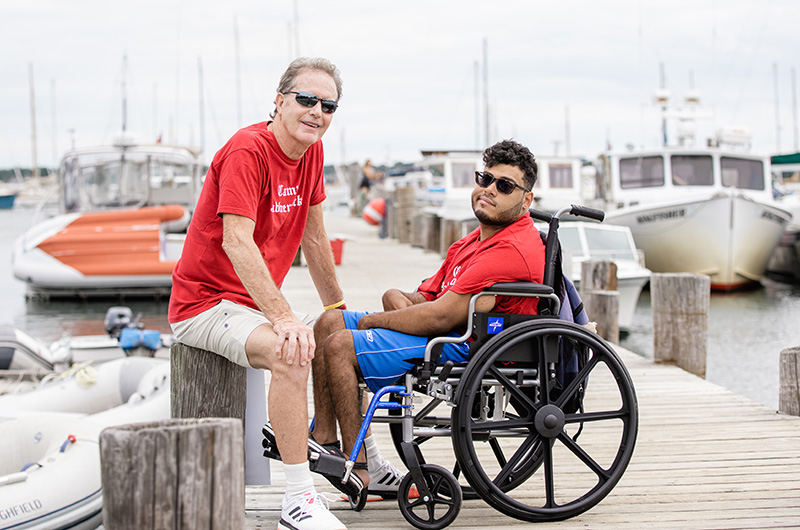At the foot of the Edgartown Lighthouse, hundreds of cobblestones etched with names compose the Children’s Memorial, which for more than 20 years has offered comfort to bereaved families who come there to remember their loved ones lost too young.
A stone on the memorial’s northeast side, where the earliest rays of sun fall as dawn breaks over Chappaquiddick, commemorates Graham Hale Gardner, a beloved member of the Camp Jabberwocky community who died in early 2010, just short of his 23rd birthday.
“When Graham passed away, his mother and I got 1,500 condolence cards,” said his father Steven Gardner, a volunteer doctor at Camp Jabberwocky ever since Graham began attending summer sessions there as a teen.
Dr. Gardner tells the story of his son’s inspiring life in a new book, Jabberwocky: Lessons in Love from a Boy Who Never Spoke. The first part of the title honors the rollicking Island camp for people with disabilities, and its philosophy of fully inclusive, deeply affectionate living, he said.
“It’s a way of looking at life, a way of opening our hearts and minds and embracing our differences rather than the opposite. It’s more about how we feel than a physical place,” he told the Gazette during a recent break from duty at the camp, where Graham’s mother Cynthia also volunteers as a cook.
“She’s there as we speak,” he said.
Graham was diagnosed with cerebral palsy as a toddler, which his father said is not a disease but the result of injury to the developing brain before or during birth.
“What that is can be a mystery,” said Dr. Gardner, a longtime internist at Massachusetts General Hospital.
Birth trauma, once thought to be the principal culprit, has proved to be a minor factor, he said.
“More often, it’s something that happens earlier in gestation,” he said. Infection or toxic exposure may be to blame, but often there’s no answer, Dr. Gardner added.
Whatever caused Graham’s case left him unable to speak and with difficulty eating. He had very limited use of his limbs and needed a wheelchair to get around. But as chronicled by his father, Graham’s life was one of boundless love and astonishing adventures. His intelligence was apparently unaffected by his condition, and while he was non-verbal, his vocal sounds and especially his appealing eyes bridged many a communication gap.
“This internal radiance exuded out of him, and that really grabbed people,” Dr. Gardner said. “You couldn’t take your eyes off him.”
More than simply an inspiring narrative, the new book is a love story tracing the deep bond between a son and his dedicated father, who spared no effort in making sure Graham enjoyed as full a life as could be. By bicycle, kayak, sailboard and even skis, the Gardner men embraced outdoor sports, their joy in the thrills coming through on the page. They traveled to Bermuda and spent weekends together in New Hampshire, where Graham attended the residential Crotched Mountain School.
Making friends everywhere he went, Graham proved an unofficial ambassador for people with disabilities.
“It was easier for people to warm up to him,” his father said.
While his parents divorced when their only son was young, they remained equally committed partners in his upbringing and care until his unexpected death from cardiac arrest following a grand mal seizure.
At first, Dr. Gardner said, he and his ex-wife weren’t certain whether they could bear to return to Camp Jabberwocky that summer of 2010, just a few months after Graham’s death. But the embrace of the camp community reassured them — as did a shower of fireflies in the darkness of Greenwood avenue on their first night back, which they took as a message from their boy.
“The woods were illuminated by thousands of fireflies,” he said. “Cynthia and I could not remember ever seeing more than a handful of fireflies.”
As a rule, the camp discourages parental involvement during the session, which is meant to be a time of respite for parents as well as a getaway for participants. But Dr. Gardner had gained valuable experience in medical care for people with disabilities, not only with Graham but by volunteering as a physician for the Massachusetts Special Olympics Team in previous summers.
So the camp bent its rules for the Gardners, putting them up in a shared house on Greenwood avenue and even allowing Graham the occasional lunch there. Along with the chance to see his boy daily, volunteering at Camp Jabberwocky allowed Dr. Gardner to extend his expert care to other people living with disabilities. In the book, he recounts bandaging a boy named Jonah, who had cerebral palsy, then struggling to make out his young patient’s words of thanks.
“I knew that I was exactly where I was meant to be,” the doctor writes.
A quarter-century later, both of Graham’s parents are still volunteering at Camp Jabberwocky, which makes them very old hands there.
“I’ve been around 25 years, so I’ve seen a lot of people come and go,” Dr. Gardner said. “The relationship, the vibe, the beauty, the love, the humor, the laughter — it’s all the same. The players have changed for the most part, but the magic of the place is the same as it ever was.”
Turning Graham’s life story into a book was a gradual process that began out of a fear of forgetting the moments father and son had shared, Dr. Gardner said.
“I would remember something that was quite poignant and not want to forget it,” he said. Writing each story down and tossing it into his desk, he found over time that he had a growing stack of memories from nearly 23 years of life together.
“Organically, it started to blossom into the possibility of a book,” he said.
In May a West Coast publisher, Made for Success, released the hardback, which is illustrated with photos of Graham and his family, friends and caregivers.
More than a decade after Graham’s death, he remains vibrant in his father’s memory, and Dr. Gardner holds open the possibility they will be reunited some day.
“I don’t have 100 per cent faith, but I have 100 per cent hope I’ll see him again,” he said.








Comments (3)
Comments
Comment policy »